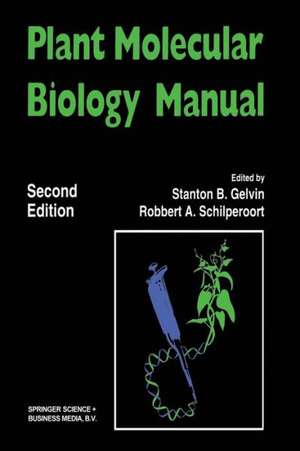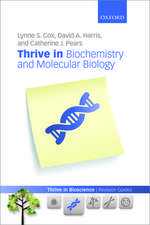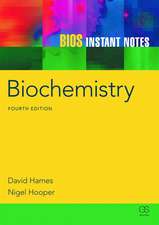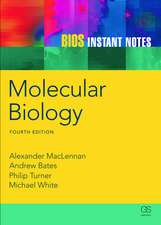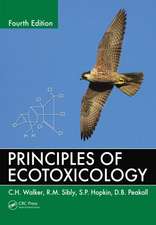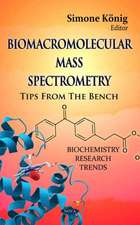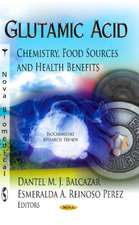Plant Molecular Biology Manual
Autor Stanton Gelvinen Limba Engleză Paperback – 13 noi 2012
| Toate formatele și edițiile | Preț | Express |
|---|---|---|
| Paperback (3) | 379.48 lei 6-8 săpt. | |
| SPRINGER NETHERLANDS – 23 aug 2014 | 379.48 lei 6-8 săpt. | |
| SPRINGER NETHERLANDS – 6 oct 2011 | 650.69 lei 6-8 săpt. | |
| SPRINGER NETHERLANDS – 13 noi 2012 | 657.25 lei 6-8 săpt. |
Preț: 657.25 lei
Preț vechi: 773.23 lei
-15% Nou
Puncte Express: 986
Preț estimativ în valută:
125.78€ • 129.94$ • 104.68£
125.78€ • 129.94$ • 104.68£
Carte tipărită la comandă
Livrare economică 25 martie-08 aprilie
Preluare comenzi: 021 569.72.76
Specificații
ISBN-13: 9789401176545
ISBN-10: 940117654X
Pagini: 640
Ilustrații: XIX, 598 p.
Dimensiuni: 155 x 235 x 34 mm
Greutate: 0.89 kg
Ediția:1994
Editura: SPRINGER NETHERLANDS
Colecția Springer
Locul publicării:Dordrecht, Netherlands
ISBN-10: 940117654X
Pagini: 640
Ilustrații: XIX, 598 p.
Dimensiuni: 155 x 235 x 34 mm
Greutate: 0.89 kg
Ediția:1994
Editura: SPRINGER NETHERLANDS
Colecția Springer
Locul publicării:Dordrecht, Netherlands
Public țintă
ResearchCuprins
Section A : In vitro methods of gene transfer to plant cells.- 1. PEG-mediated direct gene transfer and electroporation.- 2. Gene transfer to plants via particle bombardment.- Section B: Agrobacterium-mediated gene transfer to plant cells.- 1. Agrobacterium-mediated gene transfer to plant cells: cointegrate and binary vector systems.- 2. Specialized vectors for gene tagging and expression studies.- 3. Agrobacterium molecular genetics.- 4. Genetic manipulation of Agrobacterium tumefaciens strains to improve transformation of recalcitrant plant species.- 5. Transient expression assays using GUS constructs and fluorometric detection for analysis of T-DNA transfer.- 6. Agrobacterium inoculation techniques for plant tissues.- Section C: Selectable and screenable markers for plant transformation.- 1. Antibiotic-resistance markers for plant transformation.- 2. Reporter genes for plants.- 3. Opines as screenable markers for plant transformation.- Section D: Nucleic acid extraction from plant tissue.- 1. Extraction of total cellular DNA from plants, algae and fungi.- 2. Isolation and characterization of nuclear scaffolds.- 3. Isolation of plant mitochondria and mitochondrial nucleic acids.- 4. Isolation of chloroplasts and chloroplast DNA.- 5. Isolation of total, poly (A) and polysomal RNA from plant tissues.- Section E: Transcription and translation systems.- 1. Assay for gene expression using run-on transcription in isolated nuclei.- 2. Preparation of an in vitro transcription system of plant origin, with methods and templates for assessing its fidelity.- Section F: Blotting and gene detection systems.- 1. Southern, Northern and Western blot analysis.- 2. Screening of cDNA expression libraries with synthetic oligonucleotides for DNA-binding proteins.- 3. Non-radioactive nucleic acid detection systems.- Section G: In situ hybridization and immunodetection.- 1. RNA in situ hybridization in plants.- 2. In situ hybridization to plant metaphase chromosomes using digoxigenin labeled nucleic acid sequences.- Section H: Cloning and detection of DNA sequences from large DNA molecules.- 1. Methods for generating plant genomic libraries Marjory.- 2. Construction of plant yeast artificial chromosome libraries.- 3. Preparation of high molecular weight plant DNA and analysis by pulsed field gel electrophoresis.- 4. Random amplified polymorphic DNA (RAPD) markers.- Section I: Protein-nucleic acid interaction analyses.- 1. Gel mobility shift assay.- 2. Optimization of DNase I footprinting experiments.- 3. Analyses of plant chromatin and in vivo protein-DNA interactions.- 4. Expression and characterization of recombinant plant trans-acting factors.- Section J: Subcellular targeting of proteins.- 1. In vitro import of proteins into chloroplasts.- 2. In vitro targeting of proteins to mitochondria.- 3. Targeting of proteins to the vacuole.- 4. Visualizing protein import into the plant cell nucleus.- Section K: Gene tagging using transposons.- 1. Gene tagging by endogenous transposons.- 2. Heterologous transposon tagging as a tool for the isolation of plant genes.
